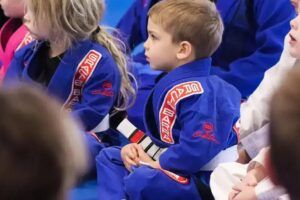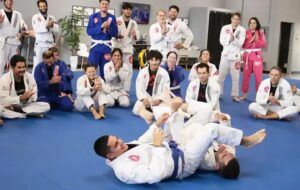When we think about Brazilian Jiu-Jitsu (BJJ), techniques, strength, and endurance often come to mind. However, one of the most critical yet underestimated aspects of the sport is breathing. Proper breathing is essential not just for performance on the mats but also for mental clarity and overall well-being. While many athletes focus on learning submissions and escapes, mastering the art of breathing can elevate your BJJ practice in ways you might not expect.
The Role of Breathing in Jiu-Jitsu
Breathing is the foundation of movement, focus, and endurance in Jiu-Jitsu. Controlled breathing helps regulate your heart rate, conserve energy, and keep your body functioning efficiently during intense training sessions. It’s not just about taking in oxygen—it’s about timing your breaths to complement your movements and staying calm under pressure.
When sparring or rolling, it’s easy to hold your breath during moments of exertion or stress, which can quickly lead to fatigue and mental fog. By practicing conscious and steady breathing, you can remain composed and sustain your energy throughout the session. Also, good breathing habits improve your ability to make strategic decisions, even in high-pressure situations.
Benefits of Proper Breathing in BJJ
1. Stress Management
Life outside the mats can be stressful, and BJJ provides a productive outlet for that tension. Breathing plays a huge role in this stress relief. Focusing on your breath during training helps you stay grounded and calm, allowing you to leave your worries at the door. Deep, controlled breaths stimulate your body’s relaxation response, helping reduce anxiety and improve your mood.
2. Mindfulness and Focus
In BJJ, the mind and body work in harmony. Breathing promotes mindfulness by bringing your attention to the present moment. Whether you’re learning a new technique or strategizing during a roll, mindful breathing keeps you focused and prevents you from becoming overwhelmed. It allows you to think clearly, react effectively, and stay engaged with your training.
3. Improved Oxygen Flow
Proper breathing ensures that your muscles and brain receive the oxygen they need to perform at their best. This not only boosts your physical endurance but also keeps your mind sharp, allowing you to anticipate your opponent’s moves and execute your own with precision.
4. Calm Under Pressure
Jiu-Jitsu often puts you in challenging positions where it’s easy to panic. Whether you’re pinned under an opponent or defending a submission, your breath can be your anchor. Staying calm and controlling your breathing in these situations can help you conserve energy, find openings, and execute your escape.
5. Better Recovery
After an intense round of rolling, controlled breathing helps you recover faster by bringing your heart rate back to normal. It allows your body to reset, so you’re ready to tackle the next round or session with renewed energy.
Breathing and Its Connection to Movement
In Jiu-Jitsu, every movement is connected to your breathing. When you align your breath with your techniques, you move more efficiently and with less effort. For example, exhaling during exertion—such as executing a sweep or finishing a submission—enhances your power and reduces strain. Inhaling during moments of control or rest helps you maintain composure and prepare for your next move.
This connection between breath and movement is not only essential for physical performance but also for mental clarity. Proper breathing creates a rhythm that keeps you in tune with your body and your actions, helping you flow seamlessly through techniques.
The Mental and Emotional Benefits of Breathing
Beyond the physical advantages, breathing is a powerful tool for mental and emotional well-being. By focusing on your breath, you cultivate a sense of mindfulness that extends beyond the mats. This practice helps you manage stress, build resilience, and approach challenges with a clear mind.
Many practitioners find that the breathing techniques they develop in Jiu-Jitsu help them navigate daily life. Whether it’s staying calm during a stressful situation at work or finding focus in a moment of chaos, the skills you develop in Jiu-Jitsu have a lasting impact on your mental health.
Applying Breathing Techniques in Training
While this article doesn’t focus on specific breathing exercises, it’s important to understand how to incorporate good breathing habits into your training. The key is to stay conscious of your breath throughout your session. Instead of holding your breath during tough spots, practice steady, rhythmic breathing to maintain control and focus.
Pay attention to how your body feels when you breathe deeply versus when your breaths are shallow and rapid. Over time, you’ll notice how effective breathing improves your performance, energy levels, and overall experience on the mats.
The Bigger Picture: Breathing for Life
The importance of breathing in Jiu-Jitsu goes far beyond the physical benefits—it’s a practice that teaches you to remain calm, focused, and adaptable in the face of adversity. These lessons don’t just apply to the mats; they can transform how you approach challenges in everyday life. From managing stress to improving your overall sense of well-being, the power of breathing is a tool that every practitioner should embrace.
Conclusion About the Importance of Breathing at Jiu-Jitsu
In Brazilian Jiu-Jitsu, breathing is much more than a way to fuel your body—it’s a cornerstone of your mental, physical, and emotional growth. By understanding its importance and integrating it into your practice, you can enhance your performance, reduce stress, and approach both Jiu-Jitsu and life with greater mindfulness and resilience. So, the next time you step onto the mats, remember to take a deep breath—it’s the first step toward mastering not just your techniques, but yourself.
If you got interested in learning more about Jiu Jitsu, check out our blog!
Book a FREE trial Jiu Jitsu class at Gracie Barra Salt Lake City


